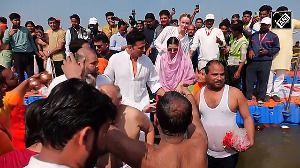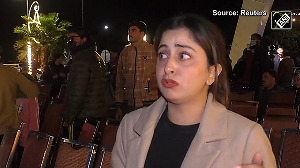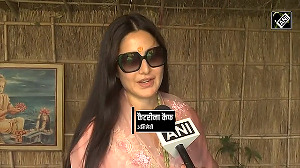Maoists on Monday got down to government formation in Nepal, which will be a multi-party coalition expected to be headed by their second ranking leader Baburam Bhattarai after the former rebels consolidated their stunning lead in landmark elections.
With the Maoists sweeping the Constituent Assembly polls bagging 106 out of the 190 declared so far and leading in 11 others, the party has initiated serious consultations including a meeting with Prime Minister G P Koirala on modalities to form the new government.
Results for 50 seats are awaited out of the 240 at stake in direct elections. The Maoists are on track to become the single largest party.
Prachanda has also met Indian Ambassador to Nepal Shiv Shankar Mukherjee and discussed the post-poll situation.
Mukherjee assured Prachanda of help no matter whatever be the election result, according to Maoist office secretary Keshav Nepal.
Prachanda told the ambassador that his party will maintain balanced relations with India.
Nepali Congress secured second position with 32 seats, Communist Party of Nepal-UML third position with 26 seats.
The Madhesi Peoples Rights Forum bagged 17 seats, Terai Madhes Democratic Party grabbed 4 seats and five seats went to small parties and an independent candidate.
Bhattarai, the second in command in CPN-Maoists after Prachanda, is most likely to lead the next government, sources close to MaoistBhattarai, the second in command in CPN-Maoists after Prachanda, is most likely to lead the next government, sources close to Maoists said.
The Maoists had projected Prachanda as the next president of Nepal during election campaign in an apparent bid to lure voters.
But as there is no legal provision to make a president in the interim Constitution, the 54-year-old former school teacher can aspire to become the president if the rewritten Constitution provides for this.
Prachanda has already said during a victory rally that his party will form a coalition government by including other major parties in the cabinet.
He also said the same when he met Prime Minister Koirala on Sunday and sought cooperation to form the new government.
Senior Maoist member Chandra Prakash Gajrel said the former rebels would "try to work together with other parties to form a coalition government", which is expected to make sweeping changes including the sacking of unpopular King Gyanendra and the abolition of the 240-year-old monarchy.
The Seven Party Alliance members including the Maoists have agreed to abolish monarchy through the first sitting of the elected assembly.
There are some 98 polling booths where polls have been cancelled and repolling is being held within a week, so it will take at least 7-8 days to form a new government and a couple of more weeks for the first meeting.
Though Maoists are sweeping in the direct elections being held for 240 seats and they are close to win majority seats under first past the post (direct voting) system, it is still not certain whether the party can get a clear majority in all 575 seats under both the proportionate and direct voting system.
Though in direct voting the Maoist party is close to crossing 50 per cent seats, but in proportionate they have just got 32 per cent votes so far followed by Nepali Congress with 23 per cent and CPN-UML with 21 per cent.
Some repolling will take place this week due to election day irregularities, with final results expected on April 22, Election Commission spokesman Laxman Bhattarai said.
Another 335 assembly members will be elected by proportional representation -- a counting method the Maoists are also expected to do well in. It could be "several weeks" before the full results for those seats are known, he said.
The final 26 seats will be appointed by an interim government to be formed after the polls.






 © 2025
© 2025